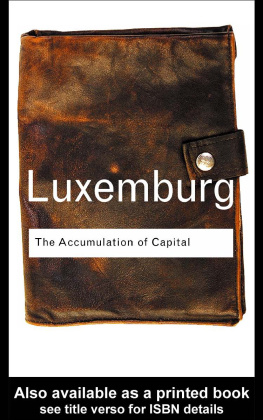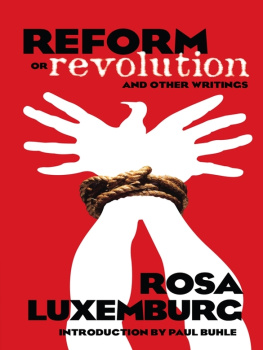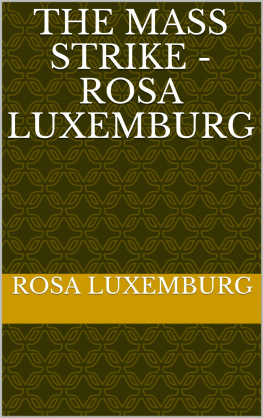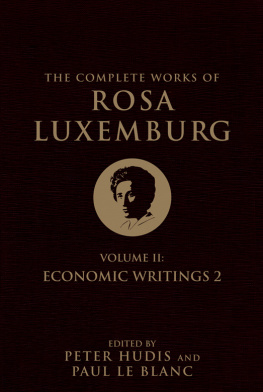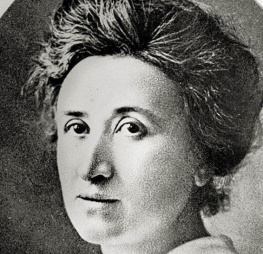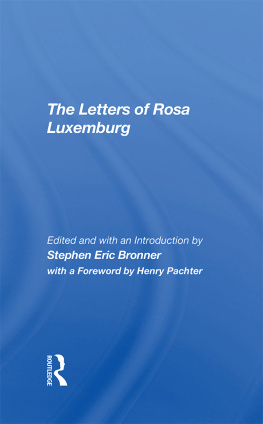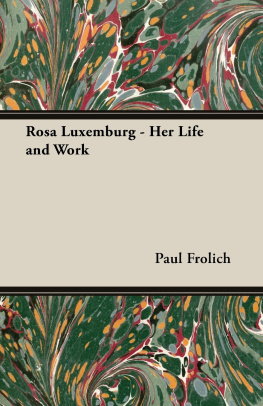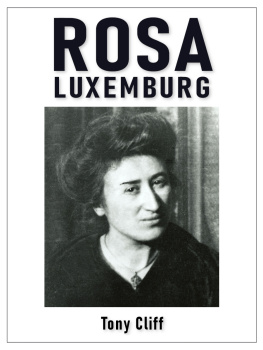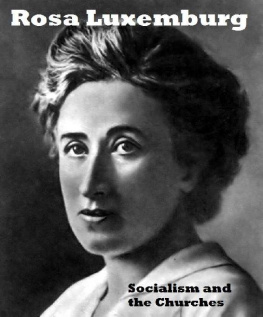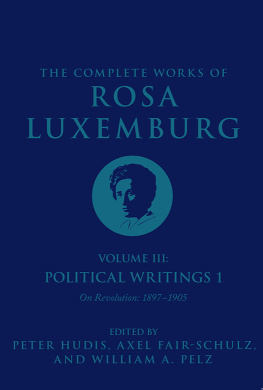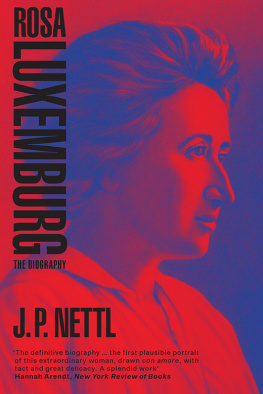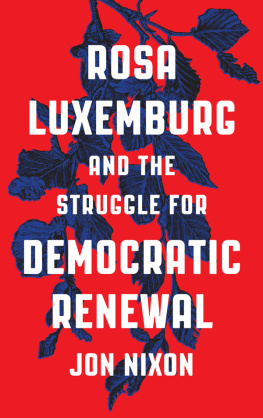Rosa Luxemburg - The Russian Revolution
Here you can read online Rosa Luxemburg - The Russian Revolution full text of the book (entire story) in english for free. Download pdf and epub, get meaning, cover and reviews about this ebook. year: 1940, publisher: Workers Age Publishers, genre: Politics. Description of the work, (preface) as well as reviews are available. Best literature library LitArk.com created for fans of good reading and offers a wide selection of genres:
Romance novel
Science fiction
Adventure
Detective
Science
History
Home and family
Prose
Art
Politics
Computer
Non-fiction
Religion
Business
Children
Humor
Choose a favorite category and find really read worthwhile books. Enjoy immersion in the world of imagination, feel the emotions of the characters or learn something new for yourself, make an fascinating discovery.

- Book:The Russian Revolution
- Author:
- Publisher:Workers Age Publishers
- Genre:
- Year:1940
- Rating:3 / 5
- Favourites:Add to favourites
- Your mark:
- 60
- 1
- 2
- 3
- 4
- 5
The Russian Revolution: summary, description and annotation
We offer to read an annotation, description, summary or preface (depends on what the author of the book "The Russian Revolution" wrote himself). If you haven't found the necessary information about the book — write in the comments, we will try to find it.
The Russian Revolution — read online for free the complete book (whole text) full work
Below is the text of the book, divided by pages. System saving the place of the last page read, allows you to conveniently read the book "The Russian Revolution" online for free, without having to search again every time where you left off. Put a bookmark, and you can go to the page where you finished reading at any time.
Font size:
Interval:
Bookmark:
By Rosa Luxemburg
Written: 1918.
Source: The Russian Revolution, by Rosa Luxemburg.
Publisher: Workers Age Publishers (New York), 1940.
First Published: 1922 by Paul Levi.
Translated: Bertram Wolfe.
Online Version: marxists.org 1999.
Transcription/Markup: A. Lehrer/Brian Baggins.
EPUB Formatting: Ian Schlom September 2020.
Contents:
Fundamental Significance of the Russian Revolution
The Russian Revolution is the mightiest event of the World War. Its outbreak, its unexampled radicalism, its enduring consequences, constitute the clearest condemnation of the lying phrases which official Social-Democracy so zealously supplied at the beginning of the war as an ideological cover for German imperialisms campaign of conquest. I refer to the phrases concerning the mission of German bayonets, which were to overthrow Russian Czarism and free its oppressed peoples.
The mighty sweep of the revolution in Russia, the profound results which have transformed all class relationships, raised all social and economic problems, and, with the fatality of their own inner logic developed consistently from the first phase of the bourgeois republic to ever more advanced stages, finally reducing the fall of Czarism to the status of a mere minor episode all these things show as plain as day that the freeing of Russia was not an achievement of the war and the military defeat of Czarism, not some service of German bayonets in German fists, as the Neue Zeit under Kautskys editorship once promised in an editorial. They show, on the contrary, that the freeing of Russia had its roots deep in the soil of its own land and was fully matured internally. The military adventure of German imperialism under the ideological blessing of German Social-Democracy did not bring about the revolution in Russia but only served to interrupt it at first, to postpone it for a while after its first stormy rising tide in the years 1911-13, and then, after its outbreak, created for it the most difficult and abnormal conditions.
Moreover, for every thinking observer, these developments are a decisive refutation of the doctrinaire theory which Kautsky shared with the Government Social-Democrats,. And all difficulties which the revolution has met with in its further course, and all disorders it has suffered are pictured as purely a result of this fateful error.
Theoretically, this doctrine (recommended as the fruit of Marxist thinking by the Vorwrts of Stampfer and by Kautsky alike) follows from the original Marxist discovery that the socialist revolution is a national and, so to speak, a domestic affair in each modern country taken by itself. Of course, in the blue mists of abstract formulae, a Kautsky knows very well how to trace the world-wide connections of capital which make of all modern countries a single integrated organism. The problems of the Russian Revolution, moreover since it is a product of international developments plus the agrarian question cannot possibly be solved within the limits of bourgeois society.
Practically, this same doctrine represents an attempt to get rid of any responsibility for the course of the Russian Revolution, so far as that responsibility concerns the international, and especially the German, proletariat, and to deny the international connections of this revolution. It is not Russias unripeness which has been proved by the events of the war and the Russian Revolution, but the unripeness of the German proletariat for the fulfillment of its historic tasks. And to make this fully clear is the first task of a critical examination of the Russian Revolution.
The fate of the revolution in Russia depended fully upon international events. That the Bolsheviks have based their policy entirely upon the world proletarian revolution is the clearest proof of their political far-sightedness and firmness of principle and of the bold scope of their policies. In it is visible the mighty advance which capitalist development has made in the last decade. The revolution of 1905-07 roused only a faint echo in Europe. Therefore, it had to remain a mere opening chapter. Continuation and conclusion were tied up with the further development of Europe.
Clearly, not uncritical apologetics but penetrating and thoughtful criticism is alone capable of bringing out treasures of experiences and teachings. Dealing as we are with the very first experiment in proletarian dictatorship in world history (and one taking place at that under the hardest conceivable conditions, in the midst of the world-wide conflagration and chaos of the imperialist mass slaughter, caught in the coils of the most reactionary military power in Europe, and accompanied by the most complete failure on the part of the international working class), it would be a crazy idea to think that every last thing done or left undone in an experiment with the dictatorship of the proletariat under such abnormal conditions represented the very pinnacle of perfection. On the contrary, elementary conceptions of socialist politics and an insight into their historically necessary prerequisites force us to understand that under such fatal conditions even the most gigantic idealism and the most storm-tested revolutionary energy are incapable of realizing democracy and socialism but only distorted attempts at either.
To make this stand out clearly in all its fundamental aspects and consequences is the elementary duty of the socialists of all countries; for only on the background of this bitter knowledge can we measure the enormous magnitude of the responsibility of the international proletariat itself for the fate of the Russian Revolution. Furthermore, it is only on this basis that the decisive importance of the resolute international action of the proletariat can become effective, without which action as its necessary support, even the greatest energy and the greatest sacrifices of the proletariat in a single country must inevitably become tangled in a maze of contradiction and blunders.
There is no doubt either that the wise heads at the helm of the Russian Revolution, that Lenin and Trotsky on their thorny path beset by traps of all kinds, have taken many a decisive step only with the greatest inner hesitation and with the most violent inner opposition. And surely nothing can be farther from their thoughts than to believe that all the things they have done or left undone under the conditions of bitter compulsion and necessity in the midst of the roaring whirlpool of events, should be regarded by the International as a shining example of socialist polity toward which only uncritical admiration and zealous imitation are in order.
It would be no less wrong to fear that a critical examination of the road so far taken by the Russian Revolution would serve to weaken the respect for and the attractive power of the example of the Russian Revolution, which alone can overcome the fatal inertia of the German masses. Nothing is farther from the truth. An awakening of the revolutionary energy of the working class in Germany can never again be called forth in the spirit of the guardianship methods of the German Social-Democracy of late-lamented memory. It can never again be conjured forth by any spotless authority, be it that of our own higher committees or that of the Russian example. Not by the creation of a revolutionary hurrah-spirit, but quite the contrary: only by an insight into all the fearful seriousness, all the complexity of the tasks involved, only as a result of political maturity and independence of spirit, only as a result of a capacity for critical judgement on the part of the masses, whose capacity was systematically killed by the Social-Democracy for decades under various pretexts, only thus can the genuine capacity for historical action be born in the German proletariat. To concern ones self with a critical analysis of the Russian Revolution in all its historical connections is the best training for the German and the international working class for the tasks which confront them as an outgrowth of the present situation.
Font size:
Interval:
Bookmark:
Similar books «The Russian Revolution»
Look at similar books to The Russian Revolution. We have selected literature similar in name and meaning in the hope of providing readers with more options to find new, interesting, not yet read works.
Discussion, reviews of the book The Russian Revolution and just readers' own opinions. Leave your comments, write what you think about the work, its meaning or the main characters. Specify what exactly you liked and what you didn't like, and why you think so.

